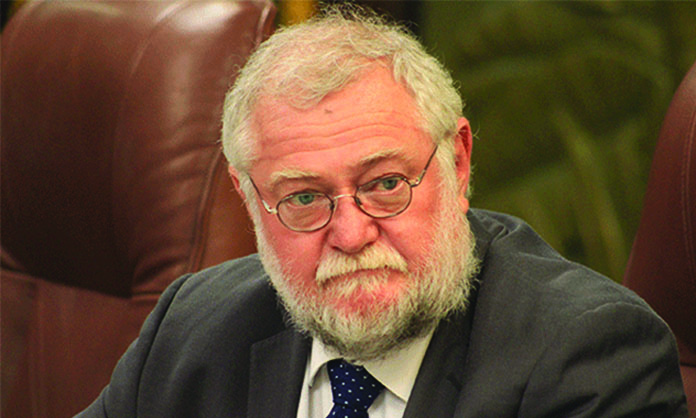The saga over uranium mining in the Stampriet Basin in southern Namibian took a new turn when Russian company Uranium One withdrew its High Court case against the minister of agriculture, water and land reform, Calle Schlettwein.
In a statement issued on Monday evening, the company confirmed withdrawing its case that was pending in the High Court.
“Uranium One Group filed an application for a review in the High Court of Namibia early in 2023 of the decision of the minister of agriculture, water and land reform to not issue the company exploration drilling permits,” the statement says.
Uranium One says it has decided to withdraw the case due to the fact that the agriculture minister brought the Water Resources Management Act into operation on 29 August 2023, although the act has been in existence since 2013.
The company further says the act introduced material changes to the previously existing legal landscape, and as such the company has decided to withdraw the case to show its intent to follow Namibia’s laws.
Agriculture ministry spokesperson Jona Musheko says the ministry is happy if the withdrawal of the Uranium One case is based on compliance with the law, because this involves protecting a shared aquifer.
“We share this resource with Botswana and South Africa and should therefore do our part to protect it,” he says.
Part of the act says the minister must ensure all Namibians have access to water, conforming to the prescribed quality standards from an affordable and reliable water supply that is adequate for basic human requirements.
The act further states that the minister can take any action he considers necessary in the public interest to remedy any situation relating to water quality which may affect the health of water users.
“As in the past, Uranium One again invites all stakeholders to engage with the company to address any issue any stakeholder may have regarding the project of the company.
“Uranium One is confident the project would hold great benefits for the country, and that the whole process of exploration, test mining and eventual mining of uranium will be absolutely safe, with the minimum negative ecological impact,” the statement says.
Although Stampriet Aquifer Uranium Mining Association (Sauma) spokesperson Tanja Dahl declined to comment on the issue, the association has in the past said there is a very real and substantial risk that in-situ leach mining would cause irreparable, widespread pollution of the groundwater and endanger the health of people and animals.
The organisation is fighting to protect the drinking water in the Stampriet Basin, and has warned the government of a national catastrophe, including litigation, should full-scale in-situ leach mining be allowed in the area.
At the launch of the third edition of Namibia’s hydrogeological map in Windhoek in October 2021, Schlettwein said the government should stop potentially harmful exploration and other mining activities in areas that have been declared water reserves.
“We would be foolish to allow competing commercial activities to threaten these groundwater reserves. I believe mining in an aquifer must in any event be carefully considered and probably prohibited upfront – especially if the minerals are available in alternative localities,” he said.
He made reference to uranium exploration activities in the Stampriet area.
“The fact is that mining and leaching are taking place within the aquifer, and the polluted water is disposed of back into the aquifer.
“This aquifer is far too valuable for a community that lives in the Kalahari. We cannot take the risk of destroying it or making it less valuable in that community,” he said.
– email: matthew@namibian.com.na
Stay informed with The Namibian – your source for credible journalism. Get in-depth reporting and opinions for
only N$85 a month. Invest in journalism, invest in democracy –
Subscribe Now!






